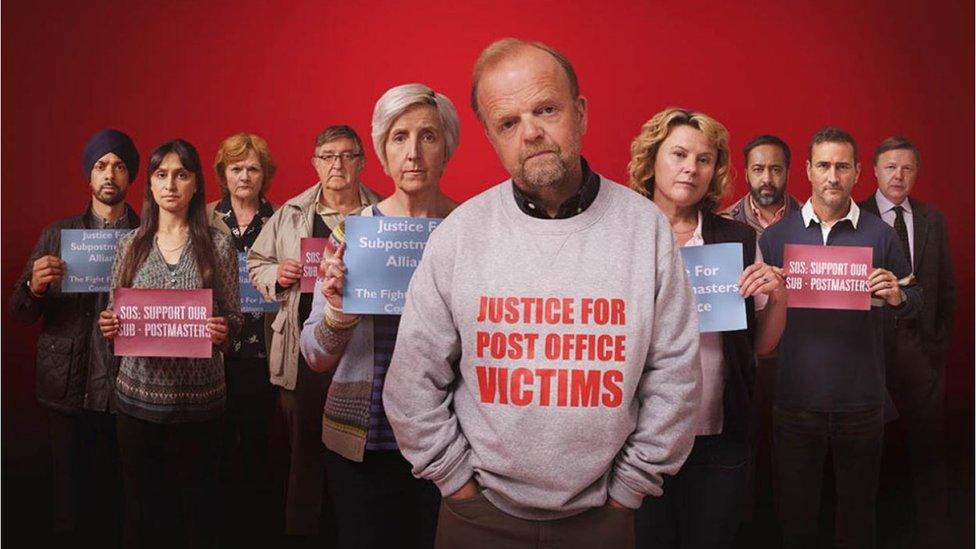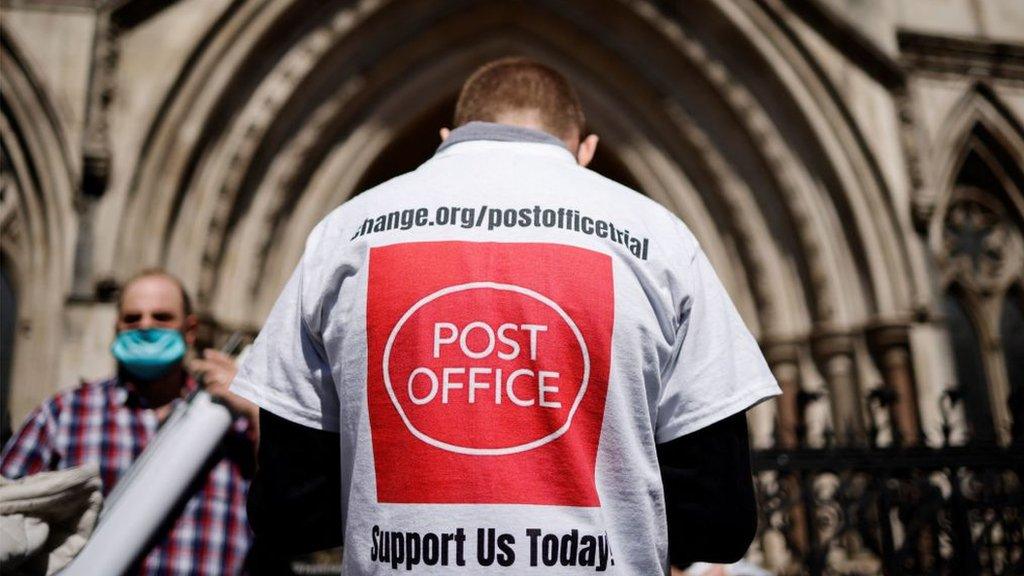Post Office scandal: Ex-sub-postmistress wants money back, not apology
- Published
Former sub-postmistress Heather Earley took £50,000 out of her pension to pay the Post Office
A sub-postmistress who was one of hundreds caught up in the Post Office scandal has said she would rather have her money back than have an apology.
Heather Earley was wrongly accused of owing thousands of pounds.
She was one of those caught up in the scandal after faulty software wrongly calculated that money was missing from post office branches.
The Newtownabbey woman used £50,000 of her pension to cover huge shortfalls that were caused by the faulty system.
When Post Office chief executive Nick Read came to Northern Ireland in 2023 to apologise to Ms Earley, she told him she would rather have her money back.
She is one of 555 sub-postmasters who won a landmark case against the Post Office in 2019.
It agreed to pay them £58m in compensation, but much of the money was swallowed up by legal fees.
Although campaigners won the right to have their cases reconsidered, as of 15 January 2024, only 95 convictions had been overturned, external.
Ms Earley opened a shop and Post Office in Mossley, County Antrim, in 2011 but her new business venture soon turned into a nightmare.
"Because I was told it was my problem, I was just lifting money out of the till of the shop and putting it into the Post Office," she said.
One of Ms Earley's customers repeatedly exploited a flaw in the system which saw her cash withdrawals credited as deposits in her account.
The woman was later convicted but the glitch left Ms Earley with a £10,000 shortfall.
"I went back to the Post Office and I said: 'Can I have my £10,000 back please?'
"And they said: "No, that was your problem not ours'."
With shortfalls appearing each week, because of Post Office's Horizon IT system, Ms Earley was forced to cash in £50,000 of her pension to cover losses.
'Someone has my money, where is it?'
She was eventually forced to close her post office in 2017 and later her shop.
"When the inquiry [into the scandal] started to come up I couldn't go back to work, I just felt so panicky. I was taking panic attacks," she said
"I've now been diagnosed with PTSD [post-traumatic stress disorder], depression, anxiety, things that I would never have had in my lifetime ever."
Between 1999 and 2015, the Post Office prosecuted 700 sub-postmasters and sub-postmistresses based on data from faulty Horizon software.
Another 283 cases were brought by other bodies including the Crown Prosecution Service.
Ms Earley and a number of other former sub-postmasters and mistresses received an apology from Mr Read when he travelled to Northern Ireland.
She said she "didn't want his apology".
"I want my money back. Someone has my money, where is it? I'd like it back," she said.
"I have suffered so much and my family have suffered so much."
She gave evidence to the Post Office Inquiry when it held hearings in Northern Ireland in 2022.
The inquiry began in 2021 and resumed earlier in January after breaking for Christmas.
On Friday, a former Post Office employee who investigated her case is due to give evidence in London.
She plans to attend the hearing along with a number of former sub-postmistresses from Northern Ireland.
"The sorry thing is it took a TV drama for all this to come to a head," she said.
"The Post Office have treated us like dirt, it's time that we get treated properly and that we get listened to because we haven't been listened to all these years."
'They were going to jail me'
The ITV drama Mr Bates vs The Post Office brought the scandal into the living rooms of millions of people across the UK.
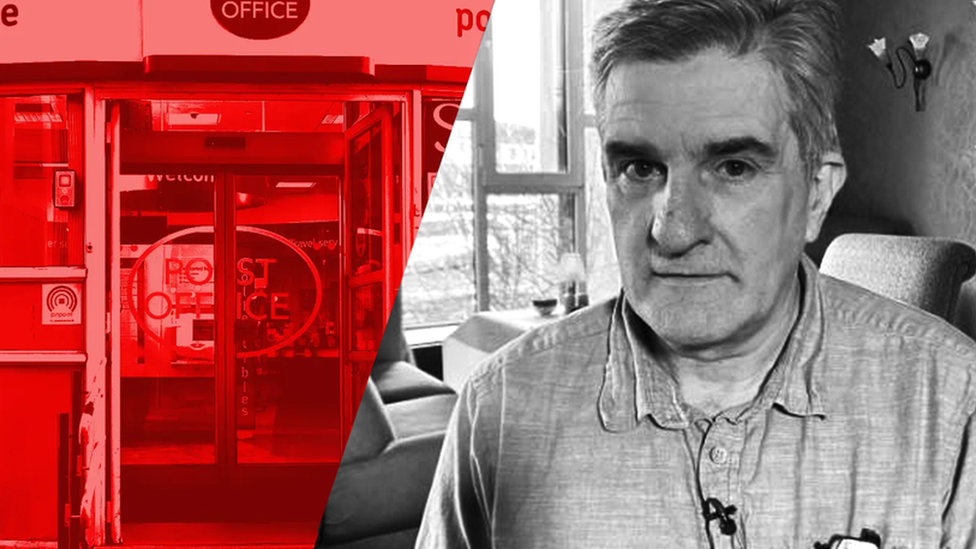
Former County Armagh sub-postmaster Owen Fearon says he was told he "owed" the Post Office £16,500
Owen Fearon has not been able to watch more than a few minutes of it and yet he knows the story inside out, it is his story too.
Mr Fearon said that with three young children and a busy corner shop in the County Armagh village of Meigh, "life was brilliant".
But things started to go wrong after he took on the lease for the Post Office in 2002.
"From day one, there would be shortages," he said.
"You kept ringing the Post Office helpline, it was no use.
"They told us 'it was your fault'."
One cold January morning in 2006, the Post Office auditor arrived, the total bill Mr Fearon was told he "owed" the Post Office was £16,500.
At a meeting at the Post Office HQ in Belfast, Mr Fearon was told he would have to pay it back or he would be sent to jail.
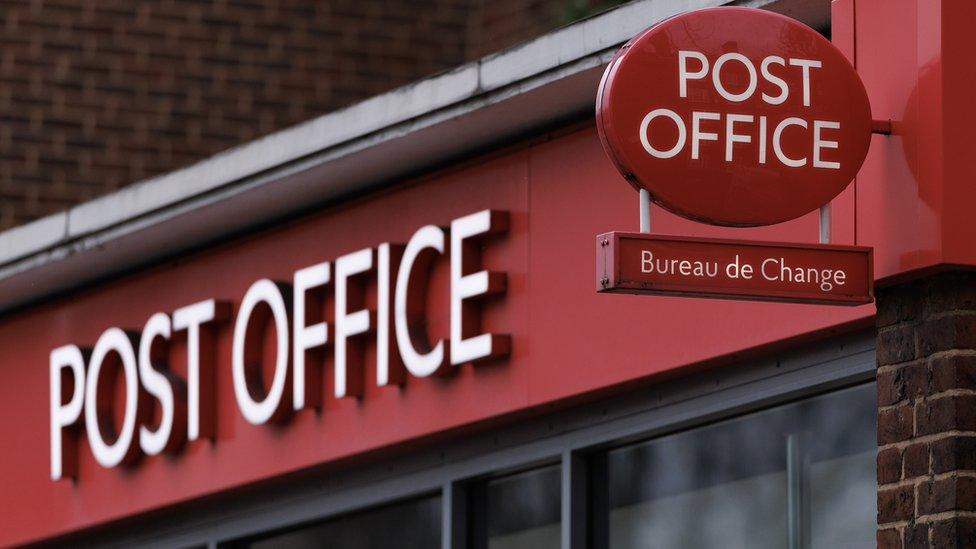
More than 700 sub-postmasters were prosecuted based on data from faulty Horizon software between 1999 and 2015
He borrowed the money and paid it back, but it had a profound impact on his life.
"Now I know what they did, it was total blackmail," he said.
"It was blackmail then and it has now been proven to be blackmail.
"We were told by the Post Office 'it was you and only you'."
Stories began to emerge in the mid 2010s, and then a Panorama programme in 2015 led Mr Fearon to contact the Post Office and challenge them on his case.
"They sent me an offer of compensation which to me, it was very, very small, for what they put me through," he added.
"Remember they were going to jail me, they were going to bankrupt me, they were going to put my wife and three children out of the house and on the street, they didn't care.
"When I disputed the compensation, they sent me back a letter - they wanted to see my medical records."
So what happens next?
"I'd love some guy from the Post Office to lift the phone, ring me and apologise for attempting to send me to jail," Mr Fearon said.
Prime Minister Rishi Sunak has announced the government will bring in a new law to "swiftly" exonerate and compensate victims.
The law will not automatically apply in Northern Ireland or Scotland, but Downing Street is "keen" to extend the provisions.
The courts system in Northern Ireland is different from England and Wales.
'Miscarriage of justice'
Although the government has promised to overturn sub-postmasters' convictions, Mr Fearon was never convicted and so his name cannot be officially cleared.
"It is totally unfair, the fact that myself and loads of other postmasters may have got the money from somewhere to pay it off, we're the forgotten ones in one sense," Mr Fearon said.
"I would dare say there are hundreds who are still keeping quiet, those who have taken compensation, minimal as it is, are probably keeping quiet.
"I would suggest they come forward now and tell their story."
And as for the programme which ignited public anger at this scandal?
"No, I can't watch it," Mr Fearon said.
"I put it on for several minutes but it just takes everything back.
"It was a total miscarriage of justice."
- Published11 January 2024
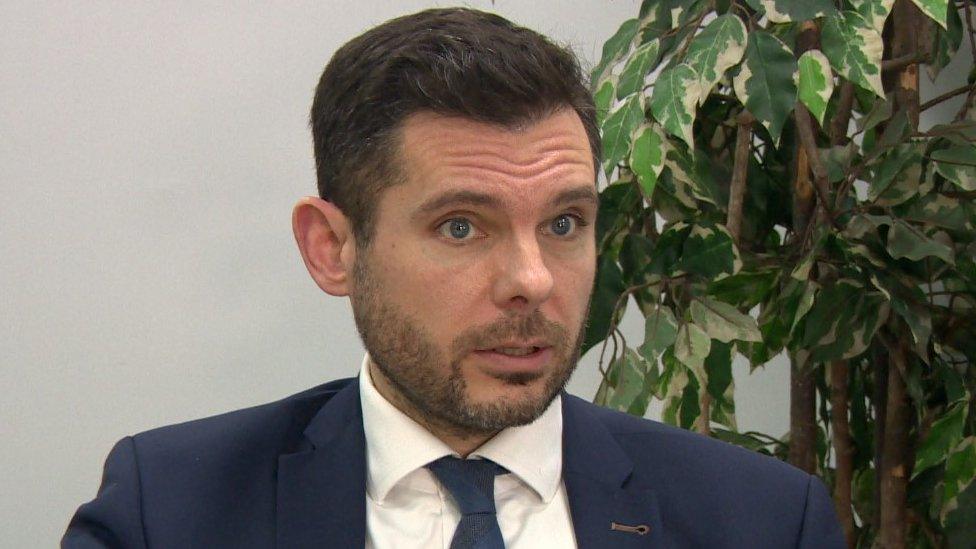
- Published11 January 2024

- Published10 January 2024
